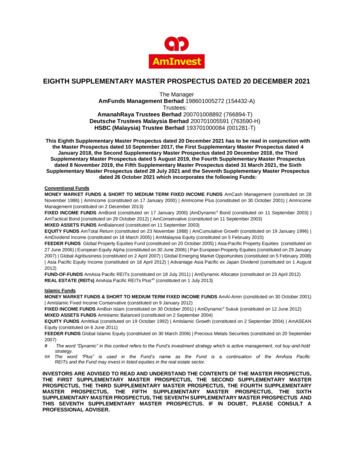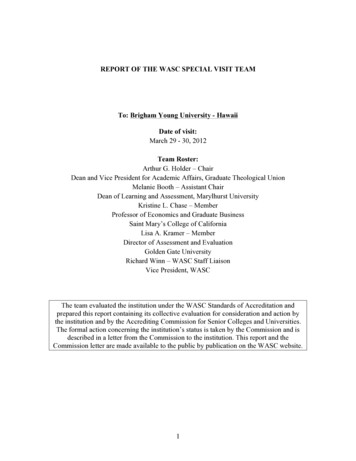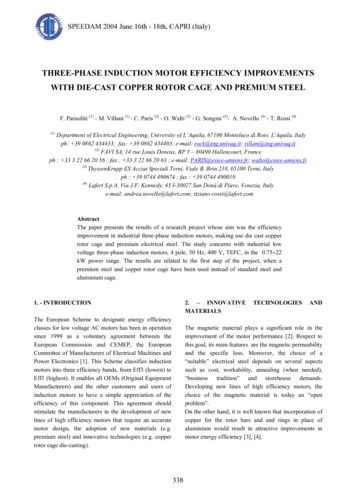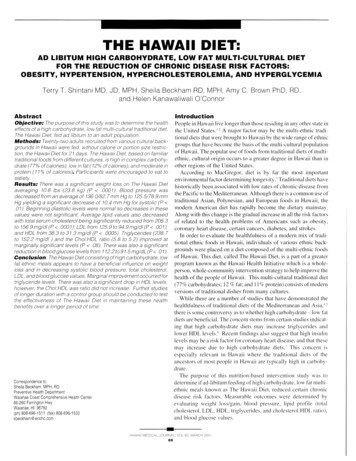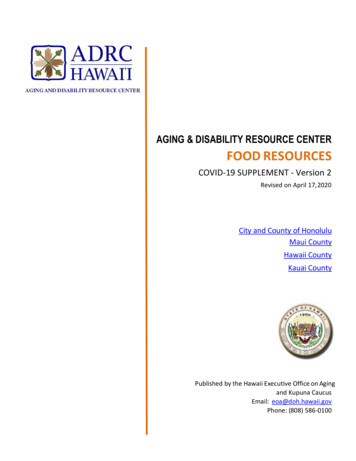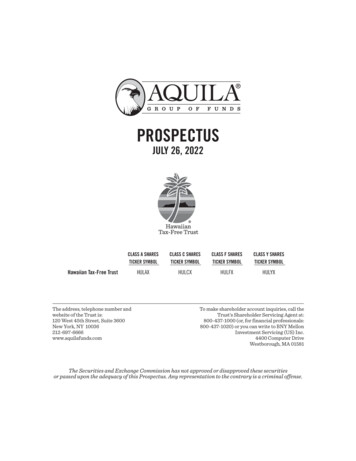
Transcription
PROSPECTUSJULY 26, 2022CLASS A SHARESTICKER SYMBOLCLASS C SHARESTICKER SYMBOLCLASS F SHARESTICKER SYMBOLCLASS Y SHARESTICKER SYMBOLHULAXHULCXHULFXHULYXHawaiian Tax-Free TrustThe address, telephone number andwebsite of the Trust is:120 West 45th Street, Suite 3600New York, NY 10036212-697-6666www.aquilafunds.comTo make shareholder account inquiries, call theTrust’s Shareholder Servicing Agent at:800-437-1000 (or, for financial professionals:800-437-1020) or you can write to BNY MellonInvestment Servicing (US) Inc.4400 Computer DriveWestborough, MA 01581The Securities and Exchange Commission has not approved or disapproved these securitiesor passed upon the adequacy of this Prospectus. Any representation to the contrary is a criminal offense.
TABLE OF CONTENTSTrust Summary . . . . . . . . . . . . . . . . . . . . . . . . . . . .1Investment Objective . . . . . . . . . . . . . . . . . . . .1Fees and Expenses of the Trust . . . . . . . . . . . . .1Principal Investment Strategies . . . . . . . . . . . . .2Principal Risks. . . . . . . . . . . . . . . . . . . . . . . . . .2Trust Performance . . . . . . . . . . . . . . . . . . . . . . .7Management . . . . . . . . . . . . . . . . . . . . . . . . . . .8Purchase and Sale of Trust Shares . . . . . . . . . . .8Tax Information. . . . . . . . . . . . . . . . . . . . . . . . .9Payments to Broker-Dealers andOther Financial Intermediaries. . . . . . . . . . .9Additional Information About the Trust’s PrincipalInvestment Strategies and Principal Risks . . . . .9Trust Management . . . . . . . . . . . . . . . . . . . . . . . . . 18Net Asset Value per Share . . . . . . . . . . . . . . . . . . . 19Purchases . . . . . . . . . . . . . . . . . . . . . . . . . . . . . . . . 20Redeeming an Investment. . . . . . . . . . . . . . . . . . . . 23Alternative Purchase Plans . . . . . . . . . . . . . . . . . . . 27Dividends and Distributions . . . . . . . . . . . . . . . . . . 36Tax Information . . . . . . . . . . . . . . . . . . . . . . . . . . . 37Financial Highlights . . . . . . . . . . . . . . . . . . . . . . . . 39Broker-Defined Sales Charge Waiver Policies. . . . . 43
TRUST SUMMARYInvestment ObjectiveThe Trust’s objective is to provide you as high alevel of current income exempt from Hawaiian stateand regular Federal income taxes as is consistentwith preservation of capital.Fees and Expenses of the TrustThis table describes the fees and expensesthat you may pay if you buy, hold and sellshares of the Trust. You may pay other fees,such as brokerage commissions and other fees tofinancial intermediaries, which are not reflectedin the tables and examples below. If you investin Class A Shares, you may qualify for salescharge discounts if you and your immediatefamily invest, or agree to invest in the future, atleast 50,000 in the Trust or in other funds inthe Aquila Group of Funds. More informationabout these and other discounts is available fromyour financial advisor and under “AlternativePurchase Plans” on page 27 of the Trust’sProspectus, “Sales Charges - Class A Shares”on page 29 of the Prospectus, “Broker-DefinedSales Charge Waiver Policies” on page 43 of theProspectus, and “Purchase, Redemption, andPricing of Shares” on page 41 of the Statement ofAdditional Information (the “SAI”). If you investin Class F Shares or Class Y Shares, you may berequired to pay a commission to a broker, whichis not reflected in the Expense Example.Class ASharesClass CSharesClass FSharesClass ment Advisory Fee0.23%0.23%0.23%0.23%Distribution and Service (12b-1) Fees0.20%1.00%NoneNoneOther Expenses0.39%0.39%0.37%0.39%Acquired Fund Fees and Expenses0.01%0.01%0.01%0.01%Total Annual Trust Operating Expenses0.83%1.63%0.61%0.63%Shareholder Fees(fees paid directly from your investment)Maximum Sales Charge (Load) Imposed onPurchases (as a percentage of offering price)Maximum Deferred Sales Charge (Load) (as apercentage of the lesser of redemption value orpurchase price)Annual Trust Operating Expenses(Expenses that you pay each year as a percentage ofyour investment)(1) Shareholders who purchase 250,000 or more of Class A Shares do not pay an initial sales charge but may pay a contingent deferred sales charge ofup to 0.75 of 1% for redemptions within one year of purchase and up to 0.50 of 1% for redemptions during the second year after purchase.ExampleThis Example is intended to help you comparethe cost of investing in the Trust with the cost ofinvesting in other mutual funds.The Example assumes that you invest 10,000in the Trust for the time periods indicated andthen redeem all of your shares at the end of thoseperiods. The Example also assumes that yourinvestment has a 5% return each year and that theTrust’s operating expenses remain the same. Sixyears after the date of purchase, Class C Sharesautomatically convert to Class A Shares. Althoughyour actual costs may be higher or lower, based onthese assumptions your costs would be:1 Hawaiian Tax-Free Trust
Class A SharesClass C SharesClass F SharesClass Y Shares1 Year 382 266 62 643 Years 557 514 195 2025 Years 747 887 340 35110 Years 1,295 1,522 762 786You would pay the following expenses if you did not redeem your Class C Shares:Class C Shares 166 514Portfolio TurnoverThe Trust pays transaction costs, such ascommissions, when it buys and sells securities(or “turns over” its portfolio). A higher portfolioturnover rate may indicate higher transaction costsand may result in higher taxes when Trust sharesare held in a taxable account. These costs, whichare not reflected in annual Trust operating expensesor in the example, affect the Trust’s performance.During the fiscal year ended March 31, 2022,the Trust’s portfolio turnover rate was 14% of theaverage value of its portfolio.Principal Investment StrategiesUnder normal circumstances, at least 80% ofthe Trust’s assets will be invested in municipalobligations that pay interest exempt, in the opinionof bond counsel, from Hawaii State and regularFederal income taxes. In general, almost all ofthese obligations are issued by the State of Hawaii,its counties and various other local authorities;these obligations may also include certain othergovernmental issuers. We call these “HawaiianObligations.” These securities may includeparticipation or other interests in municipalsecurities and variable rate demand notes. SomeHawaiian Obligations, such as general obligationissues, are backed by the issuer’s taxing authority,while other Hawaiian Obligations, such as revenuebonds, are backed only by revenues from certainfacilities or other sources and not by the issueritself. These obligations can be of any maturity,but the Trust’s weighted average maturity has 887 1,522traditionally been between 5 and 15 years. TheTrust is classified as a “non-diversified” investmentcompany under the Investment Company Act of1940 (the “1940 Act”), which means it may investa greater percentage of its assets in a smallernumber of issuers than a diversified fund.At the time of purchase, the Trust’s HawaiianObligations must be of investment grade quality.This means that they must either be rated within the four highest credit ratingsassigned by nationally recognized statisticalrating organizations or, if unrated, be determined to be of comparablequality by the Trust’s investment adviser,Asset Management Group of Bank of Hawaii(the “Adviser”).The Adviser selects obligations for the Trust’sportfolio in order to achieve the Trust’s objectiveby considering various characteristics includingquality, maturity and coupon rate.Principal RisksYou may lose money by investing in the Trust.Following is a summary description of certain risksof investing in the Trust.Market Risk. The market prices of securities orother assets held by the Trust may go up or down,sometimes rapidly or unpredictably, due to generalmarket conditions, such as real or perceivedadverse economic, political, or regulatoryconditions, recessions, inflation, changes ininterest or currency rates, lack of liquidity in the2 Hawaiian Tax-Free Trust
bond markets, the spread of infectious illness orother public health issues, armed conflict, marketdisruptions caused by tariffs, trade disputes,sanctions or other government actions, or otherfactors or adverse investor sentiment. When marketprices fall, the value of your investment will likelygo down. A change in financial condition or otherevent affecting a single issuer or market mayadversely impact securities markets as a whole.Rates of inflation have recently risen. The value ofassets or income from an investment may be worthless in the future as inflation decreases the value ofmoney. As inflation increases, the real value of theTrust’s assets can decline as can the value of theTrust’s distributions.In the past decade, financial markets throughoutthe world have experienced increased volatility,depressed valuations, decreased liquidity andheightened uncertainty. Governmental and nongovernmental issuers have defaulted on, or beenforced to restructure, their debts. These conditionsmay continue, recur, worsen or spread. Eventsthat have contributed to these market conditionsinclude, but are not limited to, major cybersecurityevents; geopolitical events (including wars,terror attacks and economic sanctions); globalpandemics; measures to address budget deficits;downgrades of sovereign debt; changes in oiland commodity prices; dramatic changes incurrency exchange rates; and public sentiment.The global pandemic of the novel coronavirusrespiratory disease designated COVID-19 hasresulted in major disruption to economies andmarkets around the world, including the UnitedStates. Global financial markets have experiencedextreme volatility and severe losses, and tradingin many instruments has been disrupted. Liquidityfor many instruments has been greatly reduced forperiods of time. Some sectors of the economy andindividual issuers have experienced particularlylarge losses. These circumstances may continuefor an extended period of time, and may continueto affect adversely the value and liquidity of theTrust’s investments. Following Russia’s recentinvasion of Ukraine, Russian stocks have lost all,or nearly all, their market value. Other securitiesor markets could be similarly affected by past orfuture geopolitical or other events or conditions.Governments and central banks, including theU.S. Federal Reserve, have taken extraordinary andunprecedented actions to support local and globaleconomies and the financial markets. These actionshave resulted in significant expansion of publicdebt, including in the U.S. The consequences ofhigh public debt, including its future impact onthe economy and securities markets, may not beknown for some time. Although they have startedto increase, interest rates are still very low, whichmeans there is more risk that they may go up.U.S. Federal Reserve or other U.S. or non-U.S.governmental or central bank actions, includingincreases or decreases in interest rates, or contraryactions by different governments, could negativelyaffect financial markets generally, increase marketvolatility and reduce the value and liquidity ofsecurities in which the Trust invests.Economies and financial markets throughout theworld have become increasingly interconnected.Economic, financial or political events, tradingand tariff arrangements, armed conflict includingRussia’s military invasion of Ukraine, terrorism,natural disasters, infectious illness or publichealth issues, cybersecurity events, supply chaindisruptions, sanctions against Russia, othernations or individuals or companies and possiblecountermeasures, and other circumstances in onecountry or region could have profound impactson other countries or regions and on globaleconomies or markets. As a result, whether or notthe Trust invests in securities of issuers locatedin or with significant exposure to countries orregions directly affected, the value and liquidityof the Trust’s investments may be negatively3 Hawaiian Tax-Free Trust
affected. The Trust may experience a substantial orcomplete loss on any security or investment.Interest Rate Risk. The market prices of theTrust’s fixed income securities may fluctuatesignificantly when interest rates change. The valueof your investment will generally go down wheninterest rates rise. A rise in rates tends to havea greater impact on the prices of longer term orlonger duration securities. In recent years, interestrates and credit spreads in the U.S. have been athistoric lows, which means there is more risk thatthey may go up. The U.S. Federal Reserve hasrecently started to raise certain interest rates. Ageneral rise in interest rates could adversely affectthe price and liquidity of fixed income securitiesand could also result in increased redemptionsfrom the Trust. The maturity of a security may besignificantly longer than its effective duration. Asecurity’s maturity and other features may be morerelevant than its effective duration in determiningthe security’s sensitivity to other factors such aschanges in credit quality or in the yield premiumthat the market may establish for certain types ofsecurities (sometimes called “credit spread”). Ingeneral, the longer its maturity the more a securitymay be susceptible to these factors. When thecredit spread for a fixed income security goesup, or “widens,” the value of the security willgenerally go down.Credit Risk. If an issuer or obligor of a securityheld by the Trust or a counterparty to a financialcontract with the Trust defaults or is downgraded,or is perceived to be less creditworthy, or if thevalue of the assets underlying a security declines,the value of your investment will typically decline.Changes in actual or perceived creditworthinessmay occur quickly. The Trust could be delayedor hindered in its enforcement of rights againstan issuer, guarantor or counterparty. Securitiesin the lowest category of investment grade (i.e.,BBB/Baa) may be considered to have speculativecharacteristics.Rating Agency Risk. Investment grade debtsecurities may be downgraded by a major ratingagency to below investment grade status, whichwould increase the risk of holding these securities.In addition, a rating may become stale in thatit fails to reflect changes to an issuer’s financialcondition. Ratings represent the rating agency’sopinion regarding the quality of the security andare not a guarantee of quality. Rating agencies aresubject to an inherent conflict of interest becausethey are often compensated by the same issuerswhose securities they grade.Risks Associated with Investments in Hawaiiand Other Municipal Obligations. The Trust maybe affected significantly by adverse economic,political or other events affecting Hawaii and othermunicipal issuers in which the Trust may invest.Hawaii’s economy, which relies substantially ontourism, the U.S. military, real estate, constructionand other service-based industries, dependssignificantly on conditions in the U.S. economyand key international economies, especiallyJapan. Hawaii’s economy will be affected by,among other factors, the health of the tourismand hospitality sectors, real or threatened actsof war or terrorism, increases in energy and fuelcosts, federal fiscal, monetary and trade policies,the strength of the global economy, including aslowdown in growth in the Japanese and Chineseeconomies, geopolitical risks, and business andconsumer uncertainty related to these issues. TheCOVID-19 pandemic dramatically altered thepublic health environment in Hawaii and hashad a significant effect on Hawaii’s economy(including increasing public and private healthemergency response costs and reducing Stateand local revenues). Tourism and travel, whichare large parts of the Hawaii economy, havebeen severely curtailed. Hawaii’s unemploymentrate has been among the highest in the nationin recent years. Hawaii, which consists entirelyof islands, is vulnerable to public health issues,4 Hawaiian Tax-Free Trust
food sustainability issues and shortages, climatechange and rising sea levels, erosion, high surf,adverse weather, and natural disasters, includingearthquakes, storms, flooding, hurricanes, tsunamisand volcanic activity. Municipal issuers may beadversely affected by rising health care costs,increasing unfunded pension liabilities, and by thephasing out of federal programs providing financialsupport. Hawaii has unfunded pension liabilities.Unfavorable conditions and developments relatingto projects financed with municipal securities canresult in lower revenues to issuers of municipalsecurities, potentially resulting in defaults. Issuersoften depend on revenues from these projects tomake principal and interest payments. The valueof municipal securities also can be adverselyaffected by changes in the financial conditionof one or more individual municipal issuers orinsurers of municipal issuers, regulatory andpolitical developments, tax law changes or otherlegislative actions, and by uncertainties and publicperceptions concerning these and other factors.Municipal securities may be more susceptible todowngrades or defaults during recessions or similarperiods of economic stress. Financial difficulties ofmunicipal issuers may continue or get worse.Tax Risk. The income on the Trust’s HawaiianObligations and other municipal obligations couldbecome subject to Federal and/or state incometaxes due to noncompliant conduct by issuers,unfavorable legislation or litigation or adverseinterpretations by regulatory authorities.Liquidity Risk. The Trust may make investmentsthat are illiquid or become illiquid after purchase.Illiquid assets may also be difficult to value.Liquidity risk may be magnified in an environmentof rising interest rates or widening credit spreads.If the Trust is forced to sell an illiquid security tomeet redemption requests or other cash needs,the Trust may be forced to sell the security at asubstantial loss or may not be able to sell at all.The Trust may not receive its proceeds from thesale of certain securities for an extended period(for example, several weeks or even longer). Inextreme cases, this may constrain the Trust’s abilityto meet its obligations (including obligations toredeeming shareholders).Prepayment or Call Risk. Many issuers havea right to prepay their securities. Issuers may bemore likely to prepay their securities if interestrates fall. If this happens, the Trust will not benefitfrom the rise in the market price of the securitiesthat normally accompanies a decline in interestrates, and will be forced to reinvest prepaymentproceeds at a time when yields on securitiesavailable in the market are lower than the yieldon prepaid securities. The Trust may also lose anypremium it paid on prepaid securities.Extension Risk. If interest rates rise, repaymentsof fixed income securities may occur more slowlythan anticipated by the market. This may drive theprices of these securities down even more becausetheir interest rates are lower than the currentinterest rate and they remain outstanding longer.Portfolio Selection Risk. The value of yourinvestment may decrease if the Adviser’s judgmentabout the quality, relative yield, value or markettrends affecting a particular security, industry,sector or region, or about interest rates, is incorrect.Valuation Risk. Nearly all of the Trust’s securitiesare valued using a fair value methodology.The sales price the Trust could receive for anyparticular portfolio investment may differ from theTrust’s valuation of the investment, particularlyfor securities that trade in thin or volatile markets.These differences may increase significantly andaffect Trust investments more broadly duringperiods of market volatility. Investors who purchaseor redeem Trust shares may receive fewer or moreshares or lower or higher redemption proceedsthan they would have received if the Trust hadnot fair-valued securities or had used a differentvaluation methodology. The Trust’s ability to value5 Hawaiian Tax-Free Trust
its investments may be impacted by technologicalissues and/or errors by pricing services or otherthird party service providers.Redemption Risk. The Trust may experienceheavy redemptions that could cause the Trust toliquidate its assets at inopportune times or at a lossor depressed value or accelerate taxable gains ortransaction costs, which could cause the value ofyour investment to decline.Cybersecurity Risk. Cybersecurity failures byand breaches of the Trust’s Administrator, Adviser,Transfer Agent, Custodian, Distributor or otherservice providers may disrupt Trust operations,interfere with the Trust’s ability to calculate itsNAV, prevent Trust shareholders from purchasing,redeeming or exchanging shares or receivingdistributions, cause loss of or unauthorized accessto private shareholder information, or result infinancial losses to the Trust and its shareholders,regulatory fines, penalties, reputational damage, oradditional compliance costs.Non-Diversification Risk. The Trust is classifiedas a “non-diversified” investment company underthe 1940 Act. Thus, compared with “diversified”funds, it may invest a greater percentage of itsassets in obligations of a small number of issuers.In general, the more the Trust invests in thesecurities of specific issuers or issues of a similarproject type, the more the Trust is exposed to risksassociated with investments in those issuers ortypes of projects. Also, the Trust may be morerisky than a more geographically diverse fund.An investment in the Trust is not a depositin Bank of Hawaii, any of its bank or non-bankaffiliates or any other bank, and is not insuredor guaranteed by the Federal Deposit InsuranceCorporation or any other government agency.These risks are discussed in more detail later inthe Prospectus or in the SAI.6 Hawaiian Tax-Free Trust
Trust PerformanceThe following bar chart and table provide some indication of the risks of investing in the Trustby showing changes in the Trust’s performance from year to year and by showing how the Trust’saverage annual total returns for the designated periods compare with those of a broad measureof market performance. The Trust’s past performance (before and after taxes) is not necessarily anindication of how the Trust will perform in the future. Updated performance information is available atwww.aquilafunds.com or by calling 800-437-1000 (toll-free).ANNUAL TOTAL RETURNS - As of December 31Class Y Shares - 2012 8201920202021Calendar YearsDuring the 10-year period shown in the bar chart, the highest return for a quarter was 2.16% (quarter endedJune 30, 2020) and the lowest return for a quarter was –2.98% (quarter ended December 31, 2016).The year-to-date (from January 1, 2022 to June 30, 2022) total return for Class Y Shares was –6.58%.7 Hawaiian Tax-Free Trust
Average Annual Total Returns forthe Periods Ended December 31, 2021Class Returns Before Taxes:Class AClass CClass FClass YClass Y Returns After Taxes:On DistributionsOn Distributions and RedemptionBloomberg Municipal Bond: Quality Intermediate Total Return IndexUnhedged USD*(This index of municipal bonds of issuers throughout the U.S. isunmanaged and does not reflect deductions for fund operating expenses,taxes or sales charges.)1 Year5 Years10 21%2.69%SinceInception3.16%(1)3.56%(1)* Source: Bloomberg Index Services Limited. BLOOMBERG is a trademark and service mark of Bloomberg Finance L.P. and its affiliates (collectively“Bloomberg”). Bloomberg, or Bloomberg’s licensors, own all proprietary rights in the Bloomberg Indices. Neither Bloomberg nor Bloomberg’slicensors approve or endorse this material, or guarantee the accuracy or completeness of any information herein, nor does Bloomberg make anywarranty, express or implied, as to the results to be obtained therefrom, and to the maximum extent allowed by law, neither shall have any liability orresponsibility for injury or damages arising in connection therewith.(1) Inception date - November 30, 2018After-tax returns are calculated using the highest individual Federal marginal income and capitalgains tax rates in effect at the time of each distribution and redemption, but do not reflect state and localtaxes. Actual after-tax returns will depend on your specific situation and may differ from those shown.The after-tax returns shown are not relevant to investors who hold Trust shares through tax-deferredarrangements such as 401(k) plans or individual retirement accounts. (Please note that an investmentin shares of the Trust may not be suitable for you if you are investing through a tax-deferred account).The total returns reflect reinvestment of dividends and distributions. After-tax returns are shown only forClass Y Shares. After-tax returns for other classes of shares will vary.ManagementInvestment Adviser – Asset Management Groupof the Bank of HawaiiAdministrator/Business Manager – AquilaInvestment Management LLC (the “Administrator”)Portfolio Managers – Mr. Reid Smith, a VicePresident and Senior Portfolio Manager with Bankof Hawaii (“BOH”), is the lead portfolio managerand has served as a portfolio manager of the Trustsince August 23, 2021. He has over 30 years ofexperience in the investment industry. Mr. StephenDodge, a Vice President and Portfolio Managerwith BOH, has served as a portfolio manager ofthe Trust since September 1, 2021. He has over5 years of experience in the investment industry.Purchase and Sale of Trust SharesYou may purchase, redeem or exchange sharesof the Trust on any day the New York StockExchange is open for business. Transactions inClass A Shares or Class C Shares may be madeeither through a financial advisor or directlywith the Trust. The minimum initial purchaseamount for Class A and Class C Shares is 1,000,or 50 if an automatic investment program isestablished. There is no minimum for subsequentinvestments. Transactions in Class F Shares andClass Y Shares may be made only through a8 Hawaiian Tax-Free Trust
financial intermediary, which may impose separateinvestment minimums.Tax InformationThe Trust intends to distribute income thatis exempt from regular Federal income tax andHawaii state income tax. Portions of the Trust’sdistributions may be subject to such taxes and/orto the Federal alternative minimum tax.Payments to Broker-Dealersand Other Financial IntermediariesIf you purchase shares of the Trust througha broker-dealer or other financial intermediary(such as a bank or financial advisor), the Trustand Aquila Distributors LLC (the “Distributor”) orthe Administrator may pay the intermediary forthe sale of Trust shares and related shareholderservicing activities. These payments create aconflict of interest by influencing the broker-dealeror other financial intermediary to recommend theTrust over another investment. Ask your financialadvisor or visit your financial intermediary’swebsite for more information.Additional Information About the Trust’sPrincipal Investment Strategiesand Principal RisksAdditional Information About the Trust’sPrincipal Investment StrategiesInvestment objectiveThe Trust’s objective is to provide you as higha level of current income exempt from Hawaiianstate and regular Federal income taxes as isconsistent with preservation of capital.Hawaiian ObligationsThe Trust invests primarily in HawaiianObligations, which are a type of municipalobligation. Hawaiian Obligations are obligationsof the State of Hawaii and its political subdivisions,agencies and public authorities and of certain othergovernmental issuers, of any maturity, the intereston which is exempt, in the opinion of bond counselor other appropriate counsel, from regular Federalincome tax and State of Hawaii income tax. TheTrust purchases the obligations of governmentalissuers other than Hawaii governmental issuersonly when obligations of the State of Hawaii andits political subdivisions, agencies and publicauthorities with the appropriate characteristics ofquality, maturity and coupon rate are unavailable.Under normal circumstances, at least 80% ofthe Trust’s assets will be invested in municipalobligations that pay interest exempt, in the opinion ofbond counsel, from Hawaii State and regular Federalincome taxes. This 80% policy may not be changedwithout shareholder approval. Except for this policyand the Trust’s investment objective, the Trust’sinvestment strategies and policies may be changedfrom time to time without shareholder approval,unless specifically stated otherwise in this Prospectusor in the Statement of Additional Information.The Trust is classified as a “non-diversified”investment company under the 1940 Act, whichmeans it may invest a greater percentage ofits assets in a smaller number of issuers than adiversified fund.Municipal ObligationsMunicipal obligations are issued by or on behalfof states, territories and possessions of the UnitedStates and their political subdivisions, agenciesand instrumentalities to obtain funds for publicpurposes. They include: municipal notes and bonds, tax, revenue or bond anticipation notes, construction loan notes, project notes, which sometimes carry a U.S.government guarantee, municipal lease/purchase agreements, participation interests in municipal or othersecurities, and floating and variable rate demand notes.There are two principal classifications ofmunicipal bonds: general obligation bonds andrevenue bonds. General obligation bonds arebacked by the full faith and credit of the issuingentity. Revenue bonds are typically used to fundpublic works projects that are expected to produceincome sufficient to make the payments on thebonds, since they are not backed by the full taxingpower of the municipality. The various publicpurposes for which municipal obligations areissued include:9 Hawaiian Tax-Free Trust
obtaining funds for general ope
least 50,000 in the Trust or in other funds in the Aquila Group of Funds. More information about these and other discounts is available from your financial advisor and under "Alternative Purchase Plans" on page 27 of the Trust's Prospectus, "Sales Charges - Class A Shares" on page 29 of the Prospectus, "Broker-Defined



